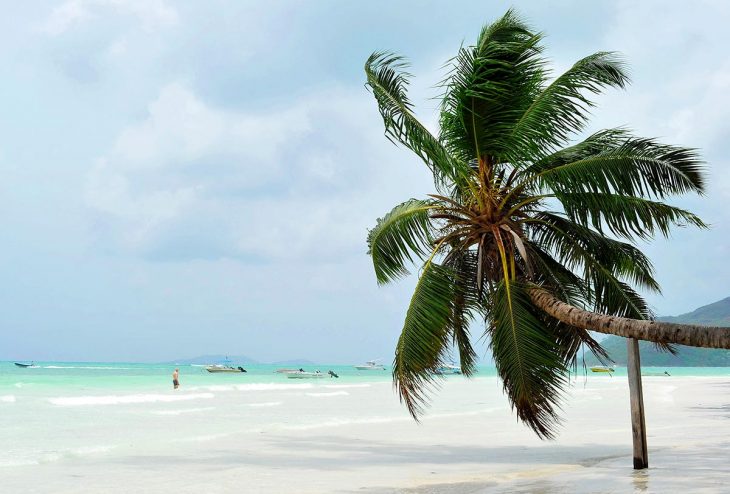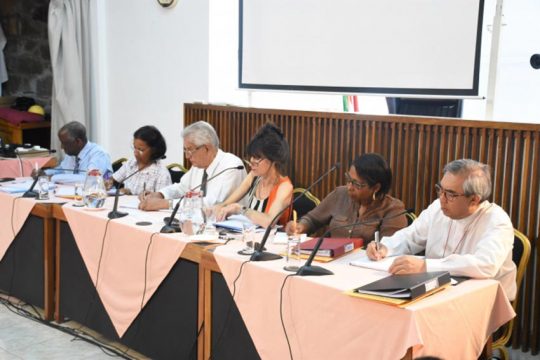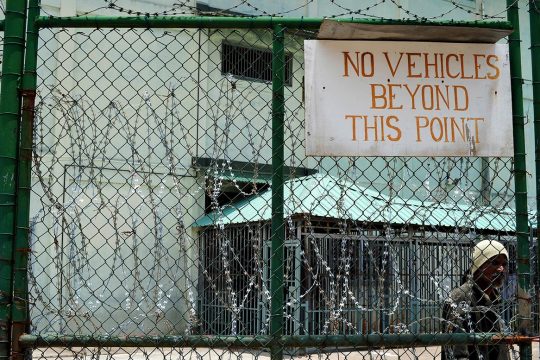"I will never forgive those who killed my brother. He asked for forgiveness and nobody was willing to pardon him. He was killed like an animal and I am not ready to forgive." On December 11, the emotional plea of Yvonne Balthilde, the complainant in case 0134, wrapped up the work of the Seychelles' Truth, Reconciliation and National Unity Commission (TRNUC) for the year. For two hours, she had recounted the death of her brother, Antoine Joubert, an escaped prisoner, who was gunned down by security forces on September 24, 2003 in the western district of Anse Louis, on the main island Mahe.
Joubert was serving a twenty-five-year sentence at the time of his death. But Balthilde said that although her brother had been involved in criminal activities since his teens his untimely death at the age of 27 was unwarranted. She accused army officers of torturing Joubert while he was in their custody at the army headquarters in Bel Eau, on the outskirt of the capital, Victoria. "His body was riddled with bullets. They shot him nine times. How can you do this to a person, one who had previously begged for forgiveness", Balthilde asked the commission. The mother of four pleaded to the commission to seek the truth in Joubert's death. "Some people who have testified before this commission have tried to justify the coup d'etat, saying it led to prosperity for the country. But did we kill people before the coup d'etat? Did we gun down people just because we felt like it?", lamented Balthilde.
This story was added to many more painful accounts that have been heard during the previous fifteen months by the Seychelles' first truth and reconciliation commission, set up to investigate allegations of human rights abuses leading to and post the coup d'etat of 1977, which claimed several lives, led to a one-party state and forced many into exile.
The rising number of cases
In an interview with Justice Info last December, Gabrielle McIntyre, chairperson of the TRNUC, stated that at the end of its session in December the Commission has begun hearing evidence in approximately 182 cases. This number is likely to rise to 256 in 2021, she said, with determinations of prima facie admissibility on the 126 cases that are pending, because the complainants have not yet filed the information necessary for the Commission to make its determination.
The complainants before the TRNUC are 496 in total for a country that has over 98,000 citizens. Their claims include murders, disappearance, illegal acquisition of private owners' lands, victimization that include being deprived the right to work or unjustified lay-offs, as well as political persecution. Out of the 496, 321 have been determined prima facie admissible, 27 inadmissible, while 22 have been retracted and a further 126 remain pending a prima facie admissibility determination.
The commission work consists of listening to witnesses as well as analysing various documentary materials, relevant legal framework and applicable human rights standards. It has to consider granting amnesties, reparations and compensation.
Lack of access
A point of concern throughout the year was a lack of tangible evidence for most of the cases. "The task of the Commission is not easy," explained McIntyre, "most requests for access to documentary evidence are not satisfied as files have been lost, damaged or destroyed." Locating witnesses and suspects locally and around the globe has also been a challenge. "To date the Commission has sent out over 1700 letters to complainants, witnesses and suspects and will have heard the testimony of over 500 persons," said McIntyre.
For three months between August and November 2020, the TRNUC went quiet because of the Covid-19 pandemic and because of presidential and legislative elections that took place on 22-24 October. McIntyre said that the Commission had initially taken a decision not to sit during the election period so as not to influence the election results. The initial idea was that during that period the TRNUC would work on investigative steps in its active cases and seek to complete its prima facie admissibility determinations on all the complaints filed before it. But "the volume of cases pending before it, coupled with the fact that a number of persons due to be scheduled to appear before the Commission had made requests to be heard in closed session, led the Commission to determine to schedule closed session hearings", she explained. Reasons for closed sessions ranged from "health condition, concern for the well-being of others, or fear of appearing publicly and suffering negative social media fall out."
The missing truth from perpetrators
The commission was set up in September 2018 following the enactment of a law that was supported by both the United Seychelles government led at the time by former president Danny Faure and the Linyon Demokratik Seselwa (LDS), an opposition party which had a majority in the National Assembly. Last October, the opposition block led by Wavel Ramkalawan came to power with a landslide victory, and won a two-third majority in the national assembly, making way for a new government for the first time in 43 years.
Nichole Tirant Gherardi, a lawyer who is also the country's ombudswoman, said that it is "highly unlikely" that a LDS administration would challenge the existence of the TRNUC "since it was their baby in the first place." She said the real outfall will be in the Commission's "ability or inability to determine the 'truth' of all these testimonies in a climate in which so many of the 'perpetrators' have failed to come forward to explain the 'whys and wherefores' in the accounts of many complainants."






